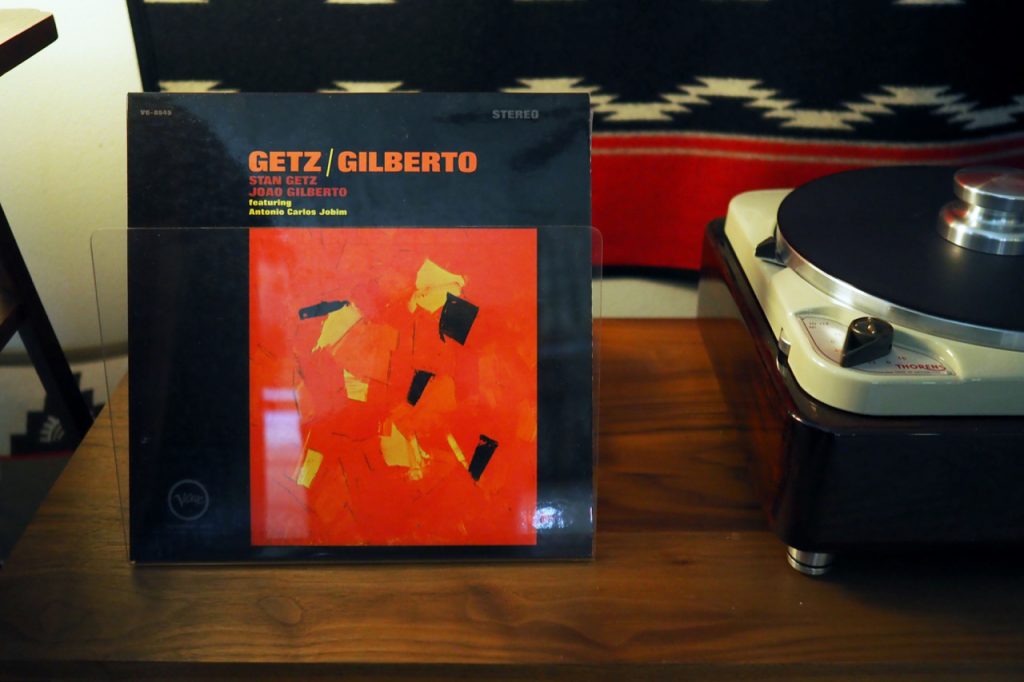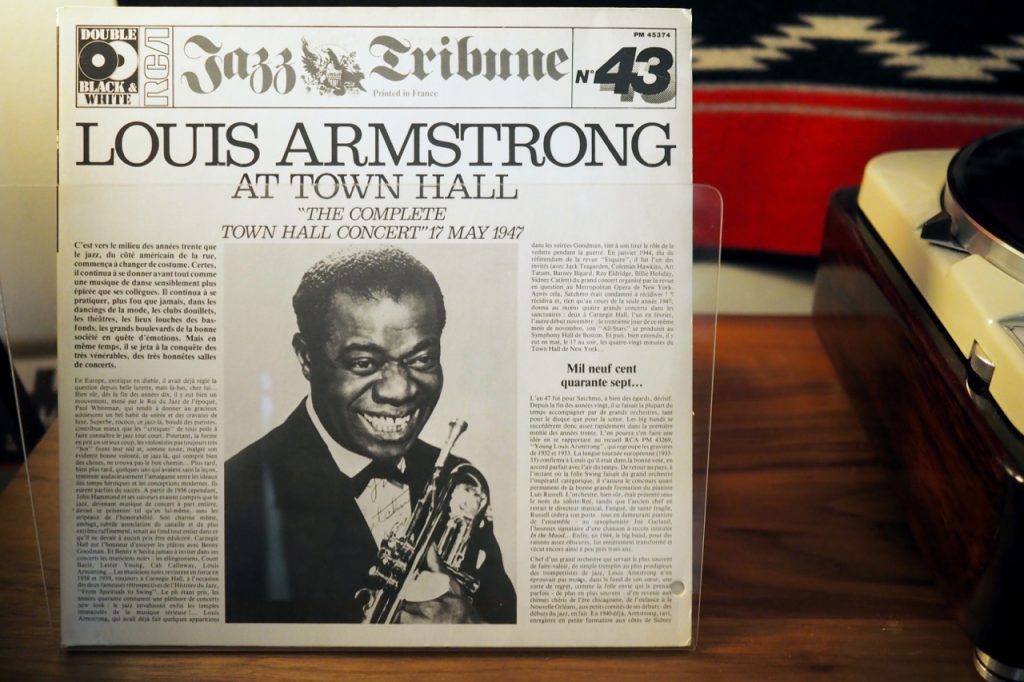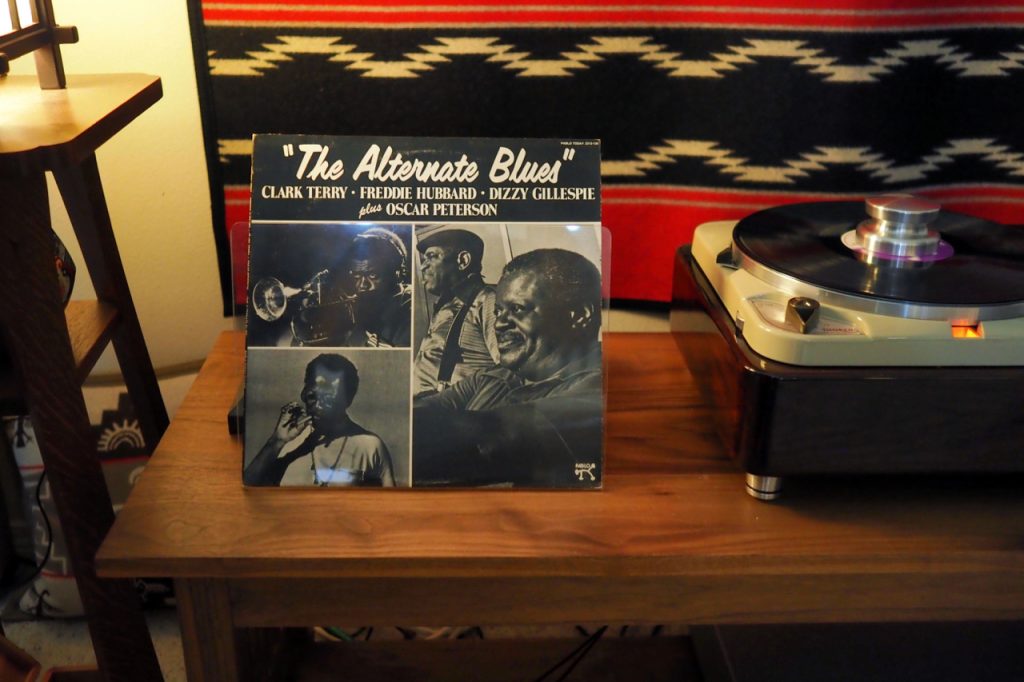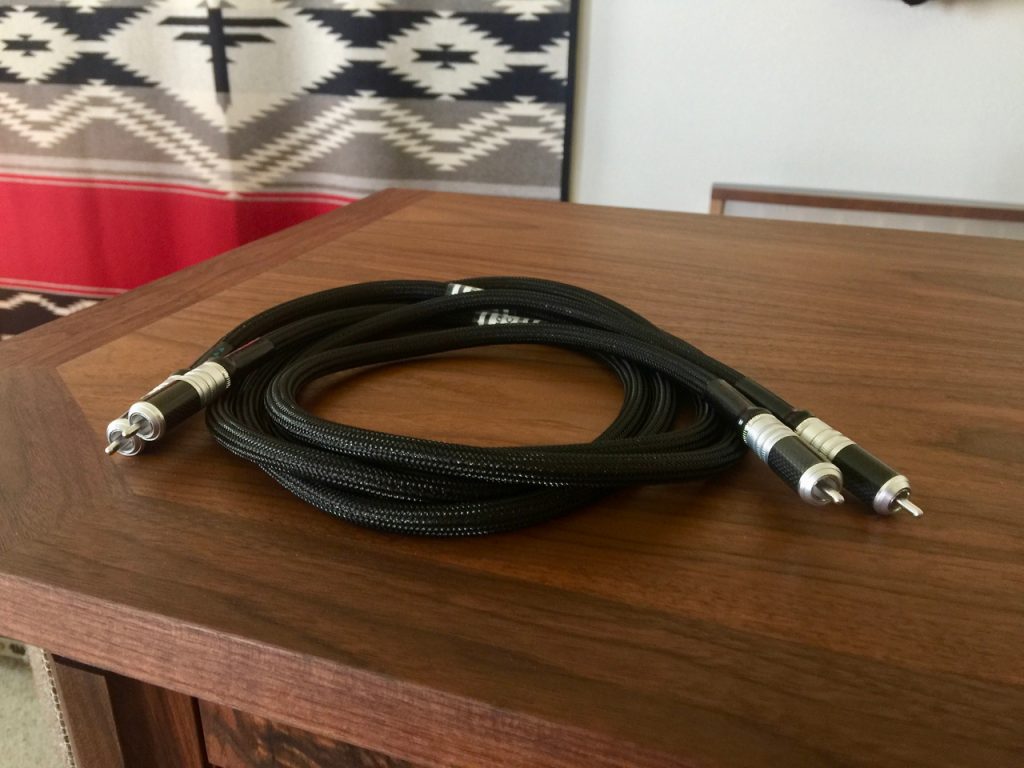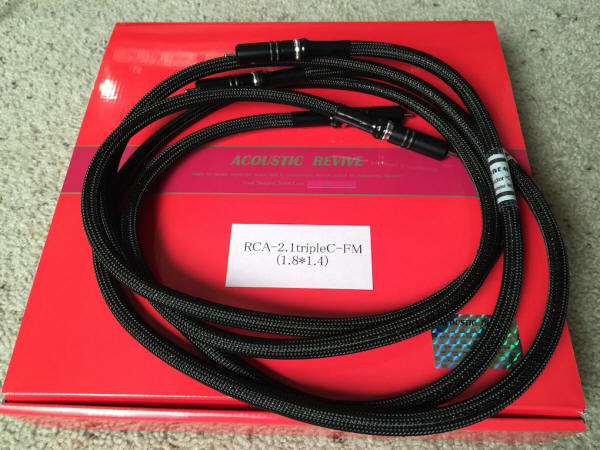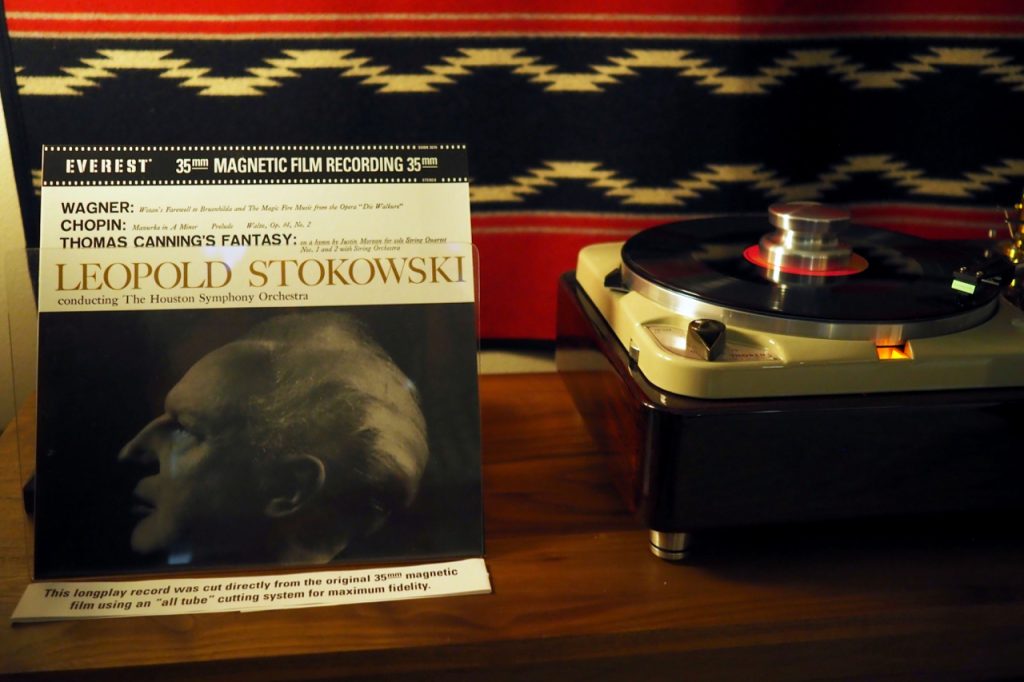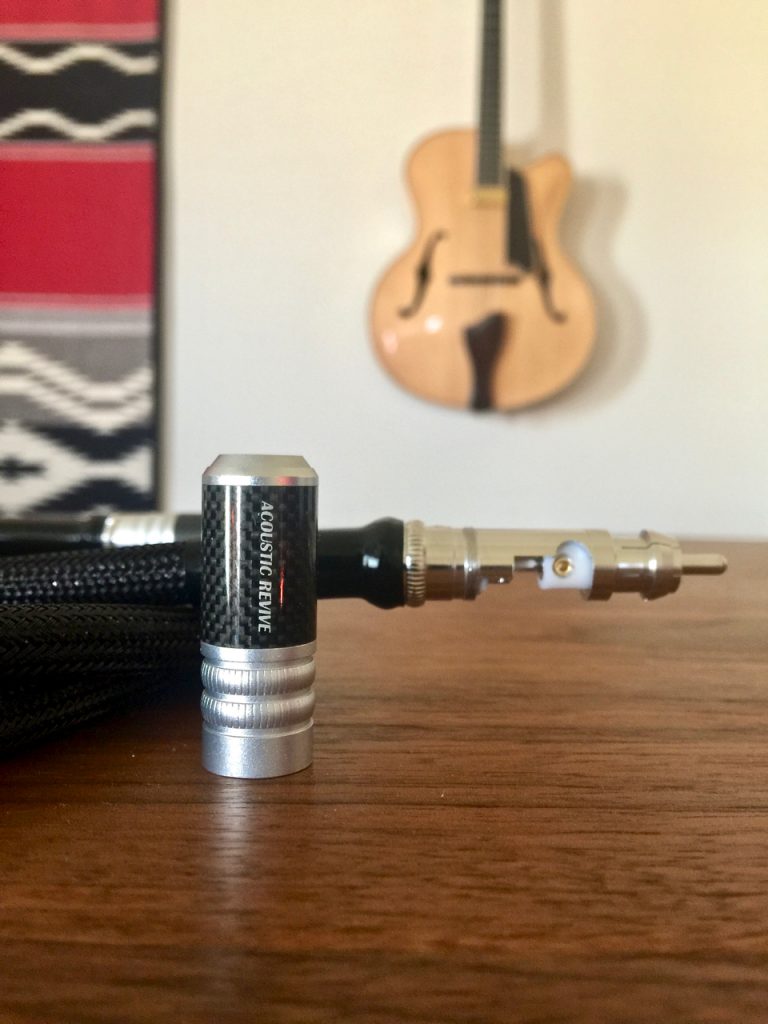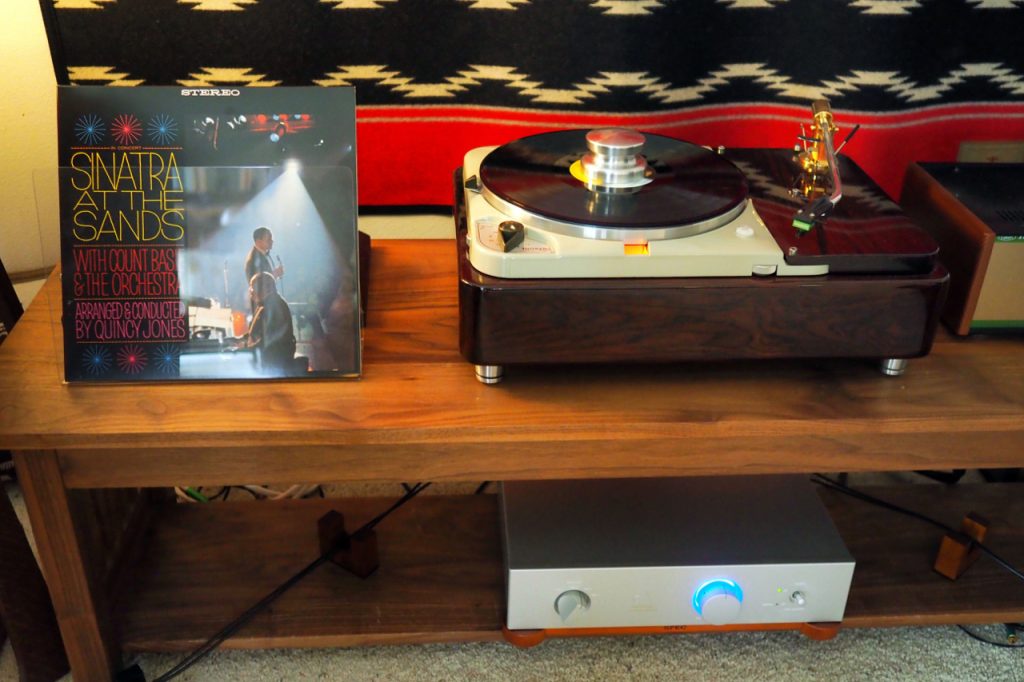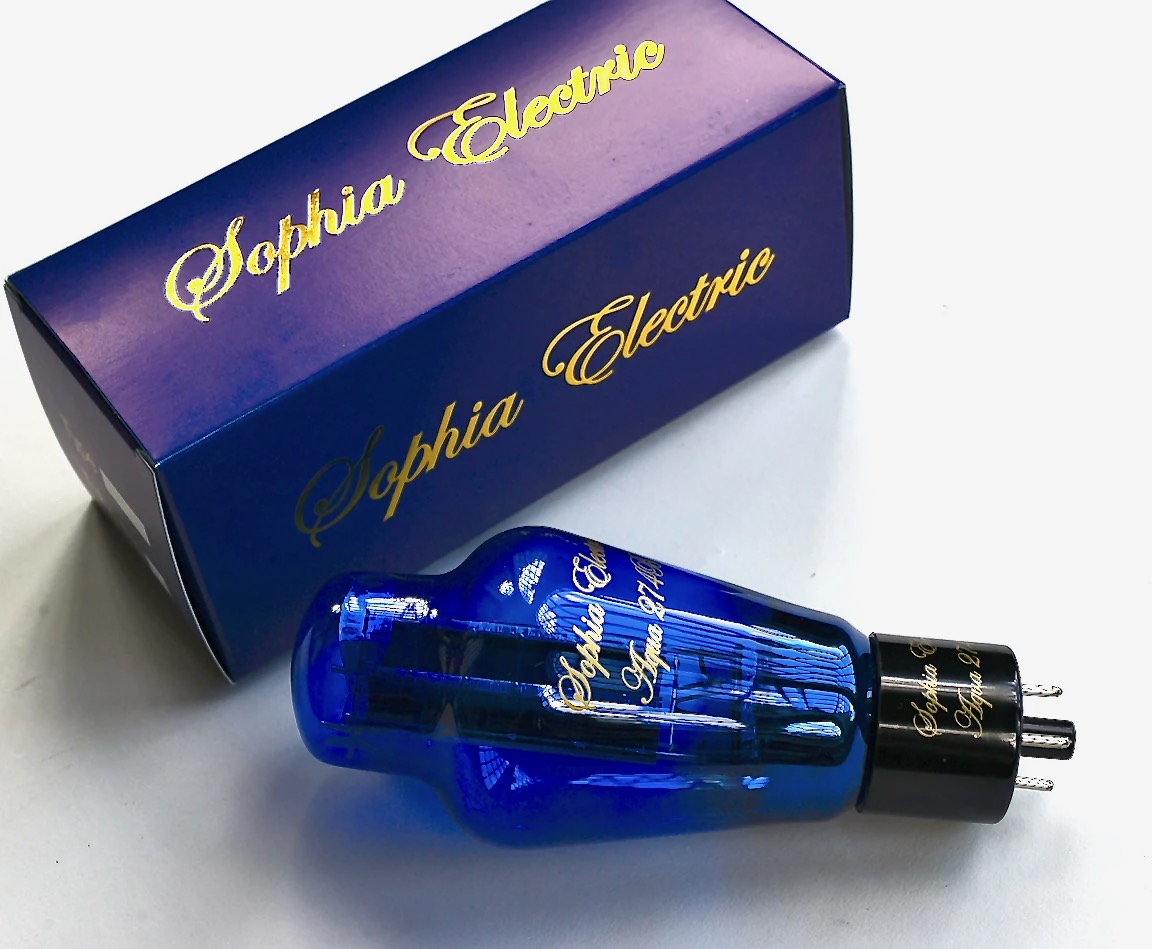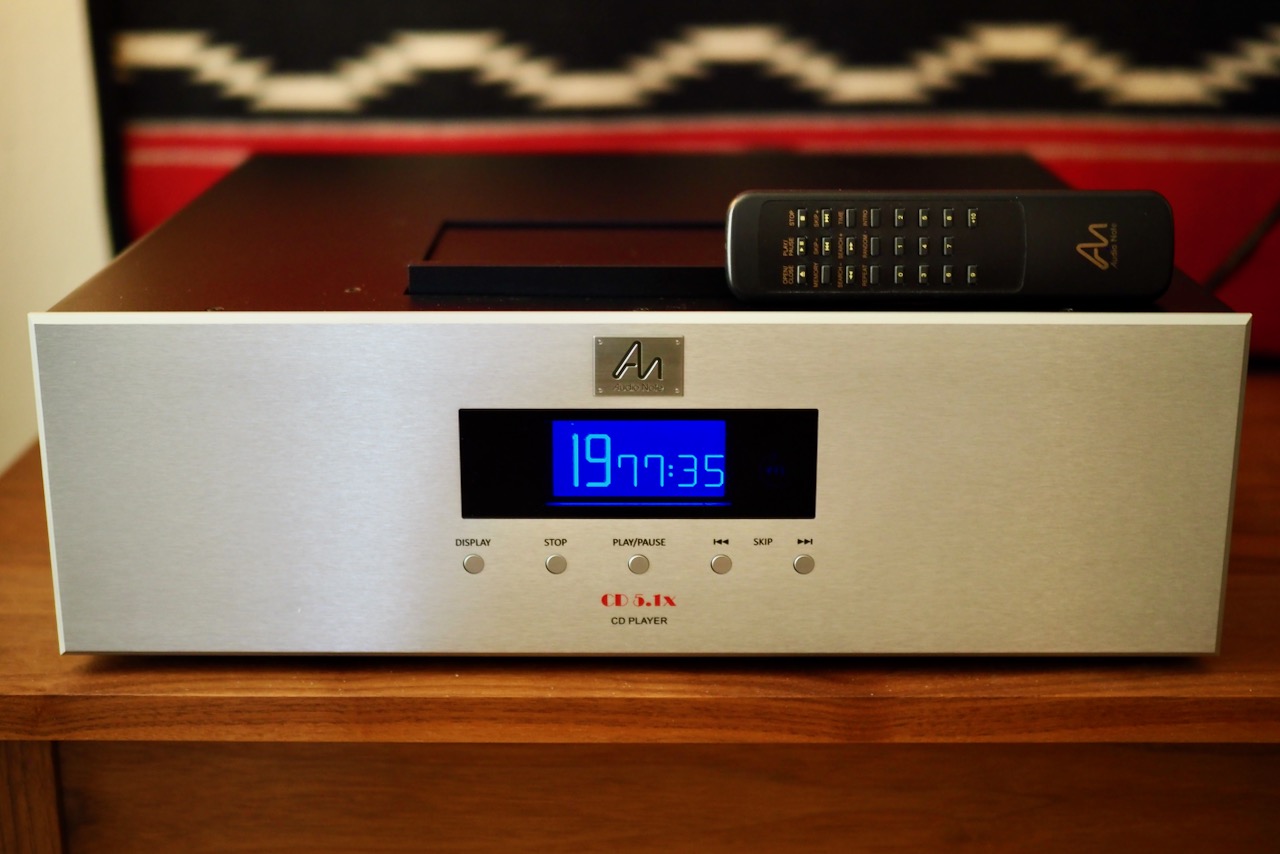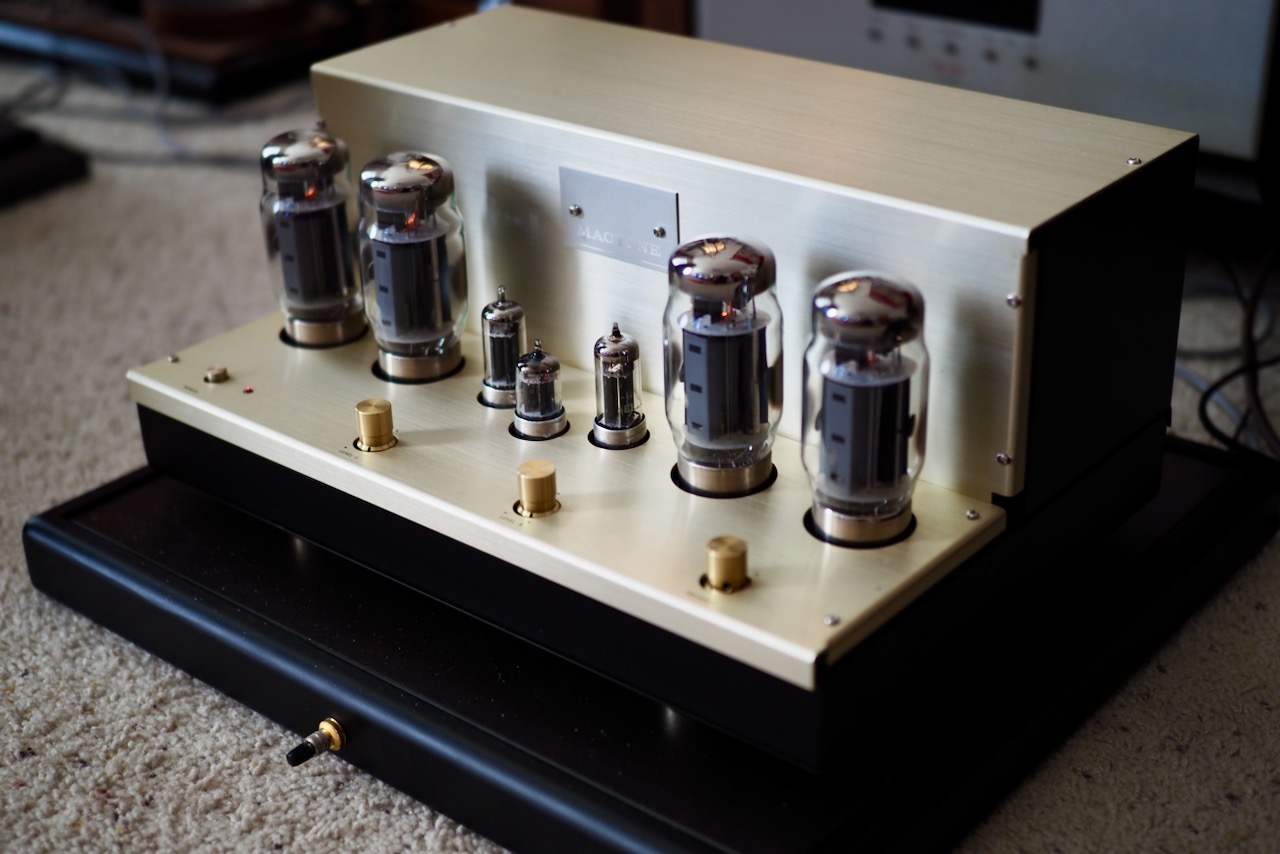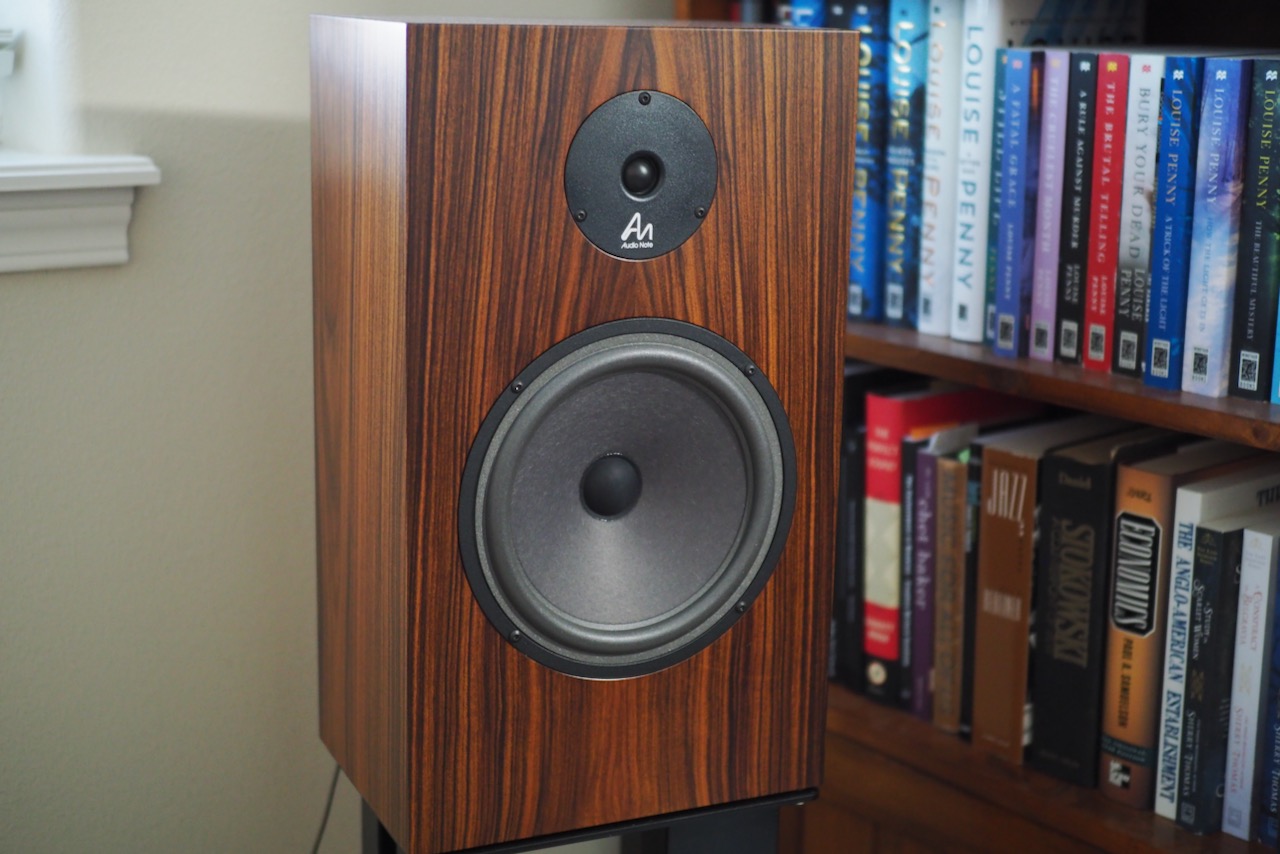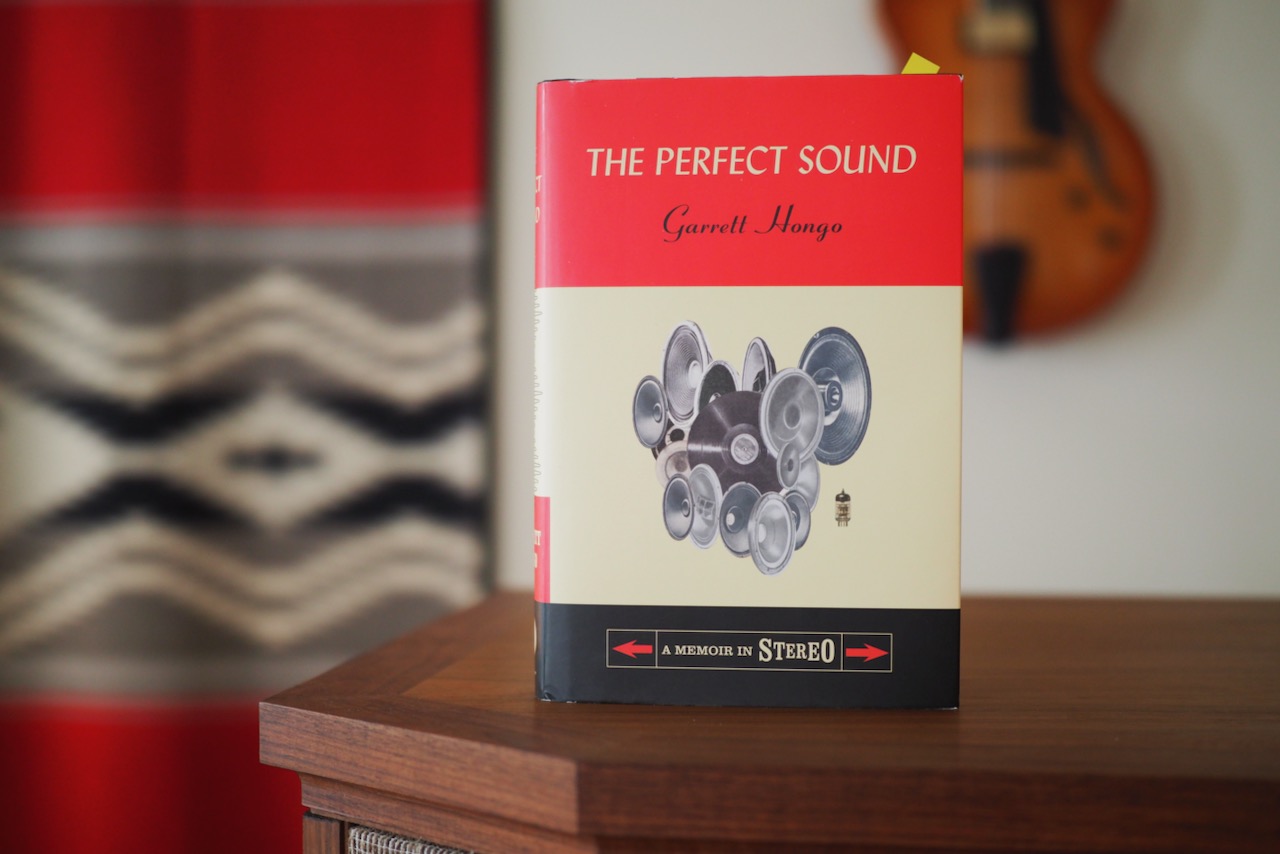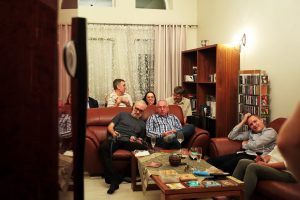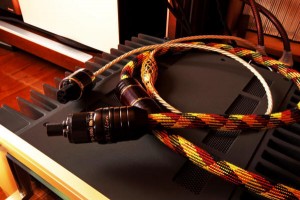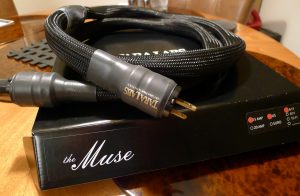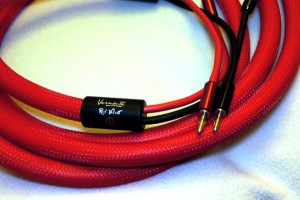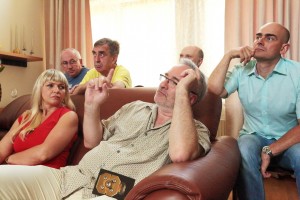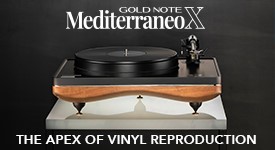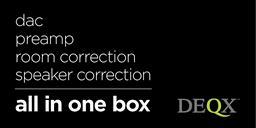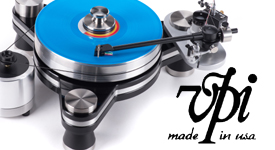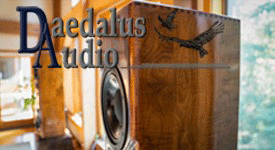Now for a few specific examples, starting with the wonderful 2011 Analogue Productions reissue of the 1964 Verve Getz/Gilberto album, featuring Sebastião Neto (double bass), Milton Banana (drums and pandeiro), João Gilberto (guitar and vocals), Astrud Gilberto (vocals), Antonio Carlos Jobim (piano), and Stan Getz (tenor sax).
I've been listening very carefully to this album of late as I am trying to learn to play the Bossa Nova rhythm on my guitar like João Gilberto (nope, not there yet!).
On the superb Analogue Productions Getz/Gilberto album the Acoustic Revive Absolute PC-Triple C/EX Lead Wires sounded stunning, with beautifully natural sounding vocals from the Gilbertos, gorgeous sax and piano tone from Getz and Jobim, and not to forget the superb Bossa Nova rhythm guitar playing of João.
The Acoustic Revive Absolute PC-Triple C/EX Lead Wires resolve a remarkable amount of information on Getz/Gilberto, and are very transparent, with well-defined images, and a huge sense of ambient space.
The amount of resolution the Acoustic Revive Absolute PC-Triple C/EX Lead Wires are capable of is more than you would hear in a live music context, where distance from the performers and the damping of bodies in the audience smooths details out somewhat, but perhaps is pretty close to what the musicians hear from their instruments while playing. If you play a musical instrument you know what I mean, as your instrument sounds quite different to you while playing, then it does to people hearing you play at a little bit of a distance.
That's neither right nor wrong, it just is, and some people will enjoy the extra resolution and transparency, while others will not. I must say that while I was listening to João's rhythm guitar playing and trying to understand exactly what he was doing, the Acoustic Revive Absolute PC-Triple C/EX Lead Wires did help me to understand his rhythm technique better, as the interaction between the bass notes and syncopated chords was more obvious than if the presentation would have been smoother and more diffuse like it is when listening from a distance.
The Acoustic Revive Absolute PC-Triple C/EX Lead Wires were impressive on the superb Analogue Productions reissue of the 1964 Verve Getz/Gilberto album, but I wondered how they would fare on a less stellar and more "real world" example of an album.
The Louis Armstrong At Town Hall "The Complete Town Hall Concert" album represents a historic concert that was recorded in 1947 at New York's Town Hall and documents an important milestone in Armstrong's career.
This concert represents a turning point where Armstrong shifts away from nearly two decades of leading big band performances, and going back to a small group reminiscent of his superb Hot Fives & Sevens performances from the 1920s.
Instead of a big band, Jack Teagarden (trombone), "Peanuts" Michael Hucko (clarinet), Bob Haggart (bass), George Wettling and Sidney Catlett (drums), Dick Cary (piano), and Bobby Hackett (cornet) join Armstrong for a stellar concert that was so vibrant and well received, that Armstrong shifted away from his big band performances and went back to a smaller group, which would eventually result in his All Stars period.
Louis Armstrong At Town Hall "The Complete Town Hall Concert" is a music lover's album consisting of spectacularly good music but a so-so live recording that is a long way from the superb recording of Getz/Gilberto. Mine is the two LP set, RCA (PM 45374), France, that was released in 1983.
For those of us who enjoy listening to important "real world" music, as well as audiophile spectaculars like Getz/Gilberto, one of the true tests of any hifi component is how well it performs on an album of great music that is a so-so recording, like that of Louis Armstrong At Town Hall "The Complete Town Hall Concert".
As I understand it, the Louis Armstrong At Town Hall "The Complete Town Hall Concert" performances were sourced from acetates, which were issued by RCA as a series of 78's in 1948, and then reissued as this double LP set by RCA in France in 1983.
If a component can't make really great music like that on Louis Armstrong At Town Hall "The Complete Town Hall Concert" sound musically enjoyable, it has failed the test as a musical device.
Frankly, given the resolution and transparency of the Acoustic Revive Absolute PC-Triple C/EX Lead Wires, I wondered if they would be able to gracefully handle albums like Louis Armstrong At Town Hall "The Complete Town Hall Concert."
The Louis Armstrong At Town Hall "The Complete Town Hall Concert" albums sounded a lot better than I was expecting with the highly resolving and transparent Acoustic Revive Absolute PC-Triple C/EX Lead Wires.
From the sonic side of life, the "scratchy" sounding acetate source material was presented without undo sibilance, albeit sounding very slightly to the lean side of life. Horns sounded just about right, not being overly forward or piercing, and Louis' vocals sounded quite good and about as rich as you could expect from them given the source material.
If you listen to a lot of historic recordings you may want a more laid back and forgiving set of lead wires than the Acoustic Revive Absolute PC-Triple C/EX Lead Wires. If you only occasionally listen to historic recordings like Louis Armstrong At Town Hall "The Complete Town Hall Concert," and most of what you enjoy is well-recorded, then the Acoustic Revive Absolute PC-Triple C/EX Lead Wires will serve you very well.
So, considering the Acoustic Revive Absolute PC-Triple C/EX Lead Wires' high level of resolution and transparency, overall, I would say that they fared quite well on this important old album, and while probably not quite ideally musical, I still enjoyed the music I was listening to in fine fashion.
An album of great jazz music that's recorded very well is The Alternate Blues (Pablo Records, 2312 136, 1982) featuring Dizzy Gillespie (trumpet), Freddie Hubbard (trumpet, flugelhorn), Clark Terry (trumpet, flugelhorn) Oscar Peterson (piano), Joe Pass (guitar), Bobby Durham (drums), and Ray Brown (double bass).
When you're horny for horns, the can't beat The Alternate Blues, and it's also a great album for checking out if you're getting natural horn timbre. The Alternate Blues is a longtime favorite of mine, but it's been a while since I've listened to this album, and I was blown away at how good it sounded with Acoustic Revive Absolute PC-Triple C/EX Lead Wires.
I think that with the Acoustic Revive Absolute PC-Triple C/EX Lead Wires "playing" the music, this is the best I've ever heard The Alternate Blues album sound. Performance like this is what you're paying the big money for!
First of all, it was utterly natural from a horn timbre standpoint, and there was no accentuated sibilance or harshness like you can sometimes get with this album. The horns sounded smooth and rich, cymbals had a beautiful shimmer, Ray's double bass had great pitch definition, Joe Pass' guitar playing sounded perfect, and Oscar's piano positively sparkled with beautiful tone.
From an audiophile sonics standpoint, the soundstage was wide and deep, imaging was superb with a lot of layering back into the soundstage, and there were all kinds of nuance present to keep things interesting.
To sum up, the Acoustic Revive Absolute PC-Triple C/EX Lead Wires sound astonishingly good on quality recordings from an audiophile sonics standpoint, with superb imaging, soundstaging, dynamics, a voluminous sense of ambient space, and state-of-art resolution and transparency.
From a musicality perspective, the Acoustic Revive Absolute PC-Triple C/EX Lead Wires get high marks for resolution of tone color, realistic timbre, as well as for a nice portrayal of melody, beat, rhythm, and harmony.
There's a couple of caveats with the Acoustic Revive Absolute PC-Triple C/EX Lead Wires that you should keep in mind, the first being that they will be at their best in a system that has a natural musical balance. If you have a hifi rig that is lean or bright sounding you're probably not going to be happy, because the Acoustic Revive Absolute PC-Triple C/EX Lead Wires will allow you to hear the leanness and brightness with high resolution and transparency, which would put me off.
The other caveat is that if you listen to a lot of music that is dicey from a recording standpoint, you're probably not the target audience that the Acoustic Revive Absolute PC-Triple C/EX Lead Wires are aimed at, which would be the audiophile or music lover that has a large collection of well recorded music, and in that latter case I suspect you will be very, very, happy listener.
Acoustic Revive RCA Absolute FM Interconnects
In this particular review system the signal chain is really simple, so it's easy to hear the differences in cables, as there's only one pair of interconnects connecting the Leben RS-30EQ valve phono preamplifier to the SPEC RSA-M3 EX Real Sound Amplifier.
I was using Duelund DCA20GA or DCA16GA interconnects in this system, but they weren't a good match for the Acoustic Revive Absolute PC-Triple C/EX Lead Wires, so out they came.
Unsurprisingly, the Acoustic Revive RCA Absolute FM Interconnects are a superb match to the Acoustic Revive Absolute PC-Triple C/EX Lead Wires, as they both use the same forged silver-copper conductor technology, albeit of a different gauge number.
For a comparator I used the previous top-of-the-line Acoustic Revive Single Core PC-TripleC RCA interconnects, which is a very fine interconnect in its own right, with oval forged copper conductors, and it is also a more relevant comparison for Acoustic Revive customers who are considering upgrading to the new Acoustic Revive RCA Absolute FM Interconnects. You can read all about the Acoustic Revive Single Core PC-TripleC RCA interconnects' construction and performance in my Positive Feedback review HERE.
Leading up to this review, I've been using the new Acoustic Revive RCA Absolute FM Interconnects in two other hifi systems in order to get a lot of run-in time on them, the first being my music system based on my vintage Altec 832A Corona loudspeakers, and the second being my audio-visual system based on my vintage Altec A5 Voice of the Theatre loudspeakers.
Straight out of the box with no time on them at all the Acoustic Revive RCA Absolute FM Interconnects sounded really, really, good, in my vintage Altec systems, which nearly always bodes of good things to come.
The Acoustic Revive RCA Absolute FM Interconnects had a rich, smooth, nuanced, transparent, and natural musical balance that I found very alluring, and they only got better with more time on them.
Since I'm listening to Leopold Stokowski's personal Altec loudspeakers as part of the reference system for this review, I thought it would be fun to listen to some of Dr. Stokowski's music played back on them, so I got out my copy of the Classic Records remaster of the Everest Leopold Stokowski LP with performances of works by Wagner, Chopin, and Thomas Canning.
Here's what it says about this LP from the Acoustic Sounds' web site (HERE):
"This release is a compilation of Stokowski/Houston performances recorded at the Houston Civic Center by Bert Whyte and originally released in 1960. Compositions include Stokowski arrangements of 'Wotan's Farewell' and 'Magic Fire Music' from Wagner's 'Die Walkure,' 'Mazurka in A minor,' 'Prelude in D minor' and 'Waltz in C sharp minor' by Chopin. Also included in the not often performed on recorded 'Fantasy on a Hymn Tune' composed by Thomas Canning. The LP, as are all reissues from this series, was cut directly from the 35mm magnetic film using a vintage Westrex 1551 tape machine, with specially built playback electronics that are vastly superior to any others used on these machines to playback the original 35mm tapes."
As you would expect the musical performances and sonics are first-rate on this Classic Records reissue of Leopold Stokowski's performances, and I love that it was cut directly from the magnetic film using a hot-rodded vintage Westrex 1551!
As I mentioned above, the overall signature of the Acoustic Revive RCA Absolute FM Interconnects was a rich, smooth, nuanced, transparent, and musical balance, that I really liked a lot.
One of the things that really impressed me was how well the Acoustic Revive RCA Absolute FM Interconnects relayed the drama, suspense, excitement, and beauty of Stokowski's arrangements of "Wotan's Farewell" and "Magic Fire Music" from Wagner's "Die Walkure".
Timbre was realistically gorgeous, whether it was strings or brass, the dynamic gradations were in full evidence, and I found myself mesmerized and hanging in suspense on every note as I listened to the music unfold and bloom in my living room – definitely goosebumps territory!
I know all of you Acoustic Revive Single Core PC-TripleC RCA interconnects owners out there are wondering how they compare to the new statement Acoustic Revive RCA Absolute FM Interconnects.
They're both very good actually, but with the new Acoustic Revive RCA Absolute FM Interconnects I got a smoother, richer, and even more natural sounding presentation, that was at the same time more nuanced, articulate, detailed, and more transparent.
There was more background "blackness" between instruments that accented the imaging, along with a greater sense of ambient space around the instruments. The soundstage was larger in all three dimensions of width, depth, and height.
There were also more tangible gradations in dynamics that contributed a sense of greater grandeur and excitement to "Wotan's Farewell" and "Magic Fire Music," for example.
These are all performance aspects that play to my personal preferences for a live-like musical performance, so yes, I really liked what the new Acoustic Revive RCA Absolute FM Interconnects were doing for the music with their exotic forged silver-copper conductors and custom RCA plugs.
I have to say that it was exciting for me to hear Dr. Stokowski's music over his personal loudspeakers, and I couldn't help but wonder if many years ago he played this same music over them for his own enjoyment. If so, I've got a pretty good idea of what he heard, and it was really good!
Next up for a listen was the 2016 double LP set reissue of Sinatra At The Sands (Universal 4770458) that was recorded live with the Count Basie Orchestra at the Sands Hotel and Casino in Las Vegas in 1966.
I really enjoy listening to live recordings so I can hear the spontaneity and interplay of the musicians, and they are a great way to check on how well components present the "live experience" of a concert.
It's fun to hear the musicians interact with the audience, and in the case of Sinatra At The Sands, with the Acoustic Revive RCA Absolute FM Interconnects I could easily hear an appreciative audience in the background enjoying themselves. Along with all the audible audience details of chit-chat, laughter, and applause, there was also a room-filling expansive sense of recorded acoustic space.
With the Acoustic Revive RCA Absolute FM Interconnects Sinatra's voice was as impressive as you would expect, and the Count Basie Orchestra was powerful and dynamic in their accompaniment.
The realism of timbre was spot on, having both natural tonality and realistic textures. Horns were timbrally about as perfect as I've heard them reproduced, having a live-like presence and tonality.
Imaging was impressive with the Acoustic Revive RCA Absolute FM Interconnects, with all the instruments in Count Basie's orchestra easily identified in the soundstage, and the soundstage was wide, with nicely layered images back into the depths of the stage.
That important trinity for home listening that makes recorded music feel like live music—tone, presence, and dynamics—were strengths for the Acoustic Revive RCA Absolute FM Interconnects on Sinatra At The Sands. As a bonus for those who like to listen at softer than live-like SPLs, the Acoustic Revive RCA Absolute FM Interconnects maintain most of that live music feeling even at lower volumes, which can be a handy for those with significant others that object to louder volumes, or those in apartments where higher SPLs can be an issue.




